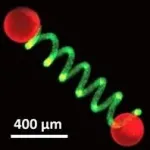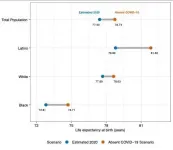(Press-News.org) HAMILTON, ON June 24, 2021 -- The idea of visiting the doctor's office with symptoms of an illness and leaving with a scientifically confirmed diagnosis is much closer to reality because of new technology developed by researchers at McMaster University.
Engineering, biochemistry and medical researchers from across campus have combined their skills to create a hand-held rapid test for bacterial infections that can produce accurate, reliable results in less than an hour, eliminating the need to send samples to a lab.
Their proof-of-concept research, published today in the journal Nature Chemistry, specifically describes the test's effectiveness in diagnosing urinary tract infections from real clinical samples. The researchers are adapting the test to detect other forms of bacteria and for the rapid diagnosis of viruses, including COVID-19. They also plan to test its viability for detecting markers of cancer.
"It's going to mean that patients can get better treatment, faster results and avoid serious complications. It can also avoid the unnecessary use of antibiotics, which is something that can buy us time in the battle against antimicrobial resistance," says Leyla Soleymani, the paper's co-corresponding author and an associate professor of engineering physics.
"This will give doctors the science to support what they already suspect based on their skills and experience," says co-corresponding author Yingfu Li, a professor of biochemistry and biomedical sciences.
The new DNA-based technology uses a handheld device similar to a blood-glucose monitor. A microchip analyzes a droplet of bodily fluid such as blood, urine or saliva, using molecules that can detect the specific protein signature of an infection. The device, about the size of a USB stick, plugs into a smartphone, which displays the result.
The invention combines electrochemical engineering technology developed by Soleymani and her team with biochemical technology developed by Li and his colleague Dingran Chang. They worked with infectious disease clinician Marek Smeija, a professor of medicine who provided samples from real patients, and with Todd Hoare, a professor of chemical engineering.
"As scientists, we want to enable things," says Li, "We are knowledgeable in different scientific and engineering principles, and when you put them together to help people, that's a special feeling. Having the chance to impact society is the reason we all do this work."
Existing practice typically requires sending samples to laboratories to be cultured, a process that can take days. Providing immediate results to patients can reduce the spread of infection, improve patients' quality of life and simplify the work of busy clinicians.
The new technology can distinguish strains of the same bacteria that can be treated with antibiotics from others that are resistant to antibiotics, a critical distinction that can help battle the growing problem of antimicrobial resistance, or AMR.
"Clinicians identified testing delays as a problem that needed to be resolved," says Soleymani, who holds the Canada Research Chair in Miniaturized Biomedical Devices. "We wanted to build a system that could give as much information as possible to the physician during the patient's first visit."
The researchers are in the midst of testing an adaptation of the same technology for the virus that causes COVID-19, using samples from a Hamilton clinic.
"This technology is very versatile and we're getting very close to using the same technology for COVID-19 testing," says Li, who is also a member of McMaster's Michael Groote Institute for Infectious Disease Research.
The researchers are exploring regulatory approvals and industry partnerships to get the technology into wide use as quickly as possible, not only in Canada, but around the world, especially where access to lab testing is limited or non-existent.
"I think this technology is a step toward democratizing disease diagnosis and management," says lead author Richa Pandey, a post-doctoral research fellow in Soleymani's lab. "This is technology that can go anywhere in the world where testing is needed."
INFORMATION:
The research exemplifies the work of Canada's Global Nexus for Pandemics and Biological Threats at McMaster University, which brings together an international network of researchers, government, industry, health care and other partners with the goal of finding solutions to the current pandemic, while preparing for future global health threats such as antimicrobial resistance.
In a few years, a new generation of quantum simulators could provide insights that would not be possible using simulations on conventional supercomputers. Quantum simulators are capable of processing a great amount of information since they quantum mechanically superimpose an enormously large number of bit states. For this reason, however, it also proves difficult to read this information out of the quantum simulator. In order to be able to reconstruct the quantum state, a very large number of individual measurements are necessary. The method used to read out the quantum state of a ...
A University of Bristol-led team of international scientists with an interest in protoliving technologies, has today published research which paves the way to building new semi-autonomous devices with potential applications in miniaturized soft robotics, microscale sensing and bioengineering.
Micro-actuators are devices that can convert signals and energy into mechanically driven movement in small-scale structures and are important in a wide range of advanced microscale technologies.
Normally, micro-actuators rely on external changes in bulk properties such as pH and temperature to trigger repeatable mechanical ...
What The Study Did: Researchers found no association between recent vaccination with the Pfizer-BioNTech BNT162b2 COVID-19 vaccine and risk of facial nerve palsy.
Authors: Asaf Shemer, M.D., of the Shamir Medical Center in Be'er Ya'akov, Israel, is the corresponding author.
To access the embargoed study: Visit our For The Media website at this link https://media.jamanetwork.com/
(doi:10.1001/jamaoto.2021.1259)
Editor's Note: Please see the article for additional information, including other authors, author contributions and affiliations, conflict of interest and financial disclosures, and funding and support.
INFORMATION:
Media ...
What The Study Did: Researchers estimated the change in life expectancy associated with the COVID-19 pandemic in the United States by race/ethnicity.
Authors: Theresa Andrasfay, Ph.D., of the University of Southern California, Los Angeles, is the corresponding author.
To access the embargoed study: Visit our For The Media website at this link https://media.jamanetwork.com/
(doi:10.1001/jamanetworkopen.2021.14520)
Editor's Note: The article includes funding/support disclosures. Please see the article for additional information, including other authors, author contributions and affiliations, conflict of interest and financial disclosures, and funding and support.
INFORMATION:
Media advisory: The full study is linked to this news release.
Embed ...
What The Study Did: Patients with COVID-19-related loss of smell were evaluated for one year after the diagnosis.
Authors: Marion Renaud, M.D., of University Hospitals of Strasbourg, France, is the corresponding author.
To access the embargoed study: Visit our For The Media website at this link https://media.jamanetwork.com/
(doi:10.1001/jamanetworkopen.2021.15352)
Editor's Note: The article includes funding/support disclosures. Please see the article for additional information, including other authors, author contributions and affiliations, conflict of interest and financial disclosures, and funding and support.
INFORMATION:
Media advisory: The full study is linked to this news release.
Embed this link to provide ...
What The Study Did: The incidence of Bell palsy among patients with COVID-19 was compared with individuals vaccinated against the disease.
Authors: Akina Tamaki, M.D., of the University Hospitals Cleveland Medical Center, is the corresponding author.
To access the embargoed study: Visit our For The Media website at this link https://media.jamanetwork.com/
(doi:10.1001/jamaoto.2021.1266)
Editor's Note: The article includes conflicts of interest disclosures. Please see the article for additional information, including other authors, author contributions and affiliations, conflict of interest and financial disclosures, and funding and support.
INFORMATION:
Media advisory: ...
An updated analysis of American COVID-19 deaths throughout 2020 reveals an even bigger drop in average life expectancy as well as still-substantial disparities by race and ethnicity.
Lead author Theresa Andrasfay, a postdoctoral scholar at the USC Leonard Davis School of Gerontology, and coauthor Noreen Goldman of Princeton University first examined the pandemic's effect on American life expectancy in October 2020. Their initial study, published in Proceedings of the National Academy of Sciences in January 2021, showed the largest single-year decline in life expectancy in at least 40 years and the lowest life expectancy estimated since 2003.
The updated analysis, which included the more than 380,000 US COVID-19 deaths in 2020 and used 2018 life expectancies as a comparison, ...
When cancers metastasize, cells from the primary tumor break away, travel through the blood or lymph system,
and form new tumors in other body parts. Although metastasis are responsible for more than 90% of all cancer
deaths, limited progress has been made in treating cancers that have spread.
Besides DNA, RNA is the other molecule of life. For several years now, RNA has become just as important as DNA in understanding the book of life. Especially, messenger RNA (mRNA), the basis of the Covid-19 vaccines, has been put in the spotlight. Just as with DNA, in addition to the 4 well known letters (A, U, G, C), there are further letters defining the RNA alphabet or ...
Discovering and engineering nanobodies with properties suitable for treating human diseases ranging from cancer to COVID-19 is a time-consuming, laborious process.
To that end, University of Michigan researchers found a simple method for identifying nanobodies with drug-like properties suitable for preventing SARS-CoV-2 infections. They demonstrated the approach by generating nanobodies that neutralized the SARS-CoV-2 virus more potently than an antibody isolated from an infected patient and a nanobody isolated from an immunized animal.
Nanobodies are small antibody fragments ...
Many people don't realize that the trillions of bacteria, viruses, and fungi residing within the gastrointestinal tract--collectively called the gut microbiome-- are connected to overall health, and specifically to cancer.
Manipulating the gut microbiome to produce "beneficial" commensal microbes, which protect the host from pathogens and can boost immune responses, among other things, could potentially help patients respond better to cancer drugs called immune checkpoint inhibitors, a type of immunotherapy.
To that end, researchers at the University of Michigan have developed ...



